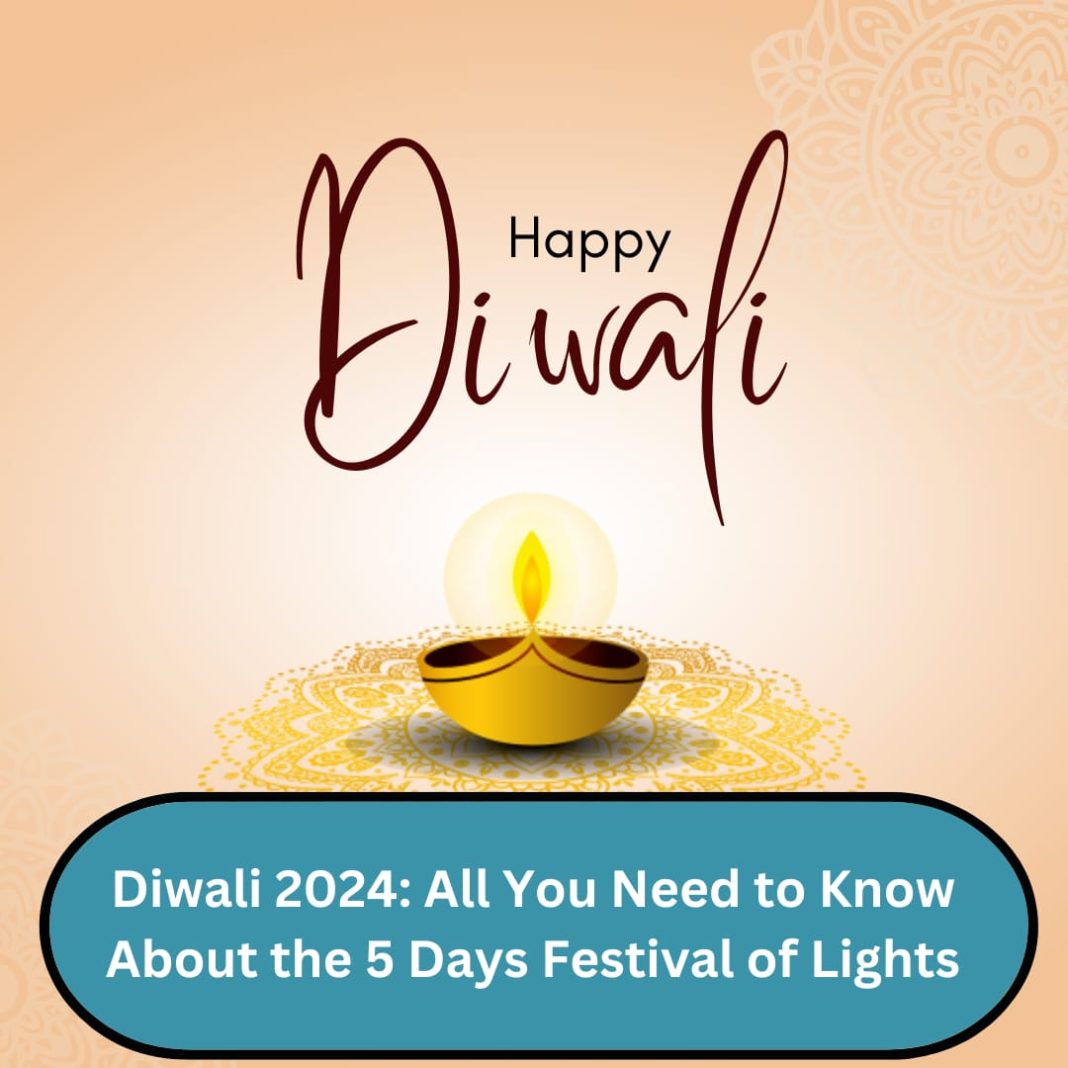Digital News Desk :
Diwali, also known as Deepawali, is one of the most widely celebrated and significant festivals in India and among Hindu communities worldwide. Diwali, often referred to as the Festival of Lights. In 2024, Diwali will be celebrated on Thursday, November 1, marking the climax of a five-day festival filled with joy, prayer, and a sense of renewal. As millions of people prepare to light their homes with lamps, share sweets, and offer prayers to the gods, Diwali continues to be a powerful symbol of victory—of light over darkness and good over evil.
Origins and Significance of Diwali
Diwali’s roots trace back to ancient Hindu mythology, where it is associated with several legends, the most popular being the return of Lord Rama to his kingdom of Ayodhya after 14 years of exile. According to the epic Ramayana, Rama’s return, after defeating the demon king Ravana, was celebrated by his subjects by lighting oil lamps, or diyas, to illuminate the path home. This gesture symbolized the triumph of good over evil and light over darkness, forming the basis of Diwali’s symbolic importance.
In addition to this central myth, other traditions mark Diwali with different deities. In many parts of India, the festival honors Lakshmi, the goddess of wealth and prosperity, and Ganesha, the remover of obstacles. For the farming and business communities, Diwali also coincides with the end of the harvest season, making it a time to thank the gods for a good harvest and pray for prosperity in the year ahead.
Diwali is not just a Hindu festival but also celebrated by Sikhs, Jains, and Buddhists, each attaching unique significance to the event. For the Sikh community, Diwali commemorates the release of Guru Hargobind Ji from imprisonment by the Mughal Emperor Jahangir. In Jainism, Diwali marks the attainment of nirvana by Lord Mahavira, while for Buddhists, it signifies the conversion of Emperor Ashoka to Buddhism.
Preparations for Diwali
Preparations for Diwali begin weeks in advance. Cleaning and decorating homes is an essential part of the celebrations, symbolizing the idea of renewal. People adorn their homes with rangoli—intricate designs made from colored powders or flowers—and light lamps and candles to invite good fortune. Shopping for new clothes, gifts, and sweets is another tradition, with markets bustling as people buy everything from festive decorations to gold jewelry and electronics.
Families also prepare traditional sweets and snacks such as ladoos, barfis, and jalebis, sharing them with neighbors and relatives. These treats are an important part of the social aspect of Diwali, fostering a sense of community and togetherness.
The week leading up to Diwali is also a time for spiritual preparation. Many people observe fasts, visit temples, and recite prayers to seek blessings for prosperity and happiness. In some regions, it’s also customary to perform Lakshmi Puja in homes and businesses, a special prayer ceremony to invoke the goddess’s blessings for the upcoming year.
The Five Days of Diwali
Diwali is not limited to a single day of celebration. It spans five days, each with its own significance:
- Dhanteras – The festival begins with Dhanteras, considered an auspicious day to purchase gold, silver, and new utensils. It is believed that buying precious metals on this day brings good luck and prosperity.
- Naraka Chaturdashi – Also known as Choti Diwali, this day celebrates the victory of Lord Krishna over the demon Narakasura. Homes are cleaned and adorned with oil lamps, symbolizing the removal of negative energy.
- Diwali – The main day of Diwali falls over two days, depending on regional traditions. Families gather for the Lakshmi Puja, lighting lamps and offering prayers to the goddess of wealth. Fireworks fill the skies, and the exchange of gifts marks this day of immense joy.
- Govardhan Puja – On this day, people worship Lord Krishna for protecting the people of Gokul from heavy rains by lifting Mount Govardhan. In many parts of India, large quantities of food are prepared as offerings.
- Bhai Dooj – The final day of the festival celebrates the bond between brothers and sisters. Sisters perform a ritual to pray for the well-being of their brothers, who in return offer gifts as a token of love and protection.
The Global Celebration of Diwali
Though Diwali is rooted in Indian tradition, it is celebrated across the globe by Hindu communities, especially in countries like Nepal, Sri Lanka, Mauritius, Malaysia, and Singapore. In recent years, Diwali has become a multicultural celebration in countries like the United States, Canada, and the United Kingdom, where the Indian diaspora celebrates with equal enthusiasm. Major cities like London, New York, and Sydney host grand Diwali festivals with parades, music, and fireworks, bringing together people of different backgrounds in a shared celebration of light.
Environmental Considerations
In recent years, there has been growing concern about the environmental impact of fireworks, which are traditionally burst during Diwali. The smoke and noise generated during the festival can contribute to air pollution, especially in cities that already struggle with smog. In 2024, many cities are expected to encourage “green Diwali” celebrations, promoting the use of eco-friendly firecrackers or opting for light shows and other environmentally conscious alternatives.
Diwali 2024: A Time for Reflection
At its heart, Diwali is a festival that encourages reflection on life’s deeper meanings. As people light lamps to dispel darkness, there is also a metaphorical call to dispel ignorance, hatred, and negativity from within. Diwali serves as a reminder of the power of love, compassion, and righteousness to overcome adversity, making it not just a religious celebration but also a universal festival of light and hope.
In 2024, as families gather to celebrate Diwali, the ancient traditions remain alive while evolving with contemporary values. Whether through traditional prayers, social gatherings, or environmental consciousness, Diwali continues to be a beacon of light, unity, and prosperity.
You May Also Read: Modi’s ASEAN 2024 Visit: Key Highlights from the ASEAN and East Asia Summits 2024








